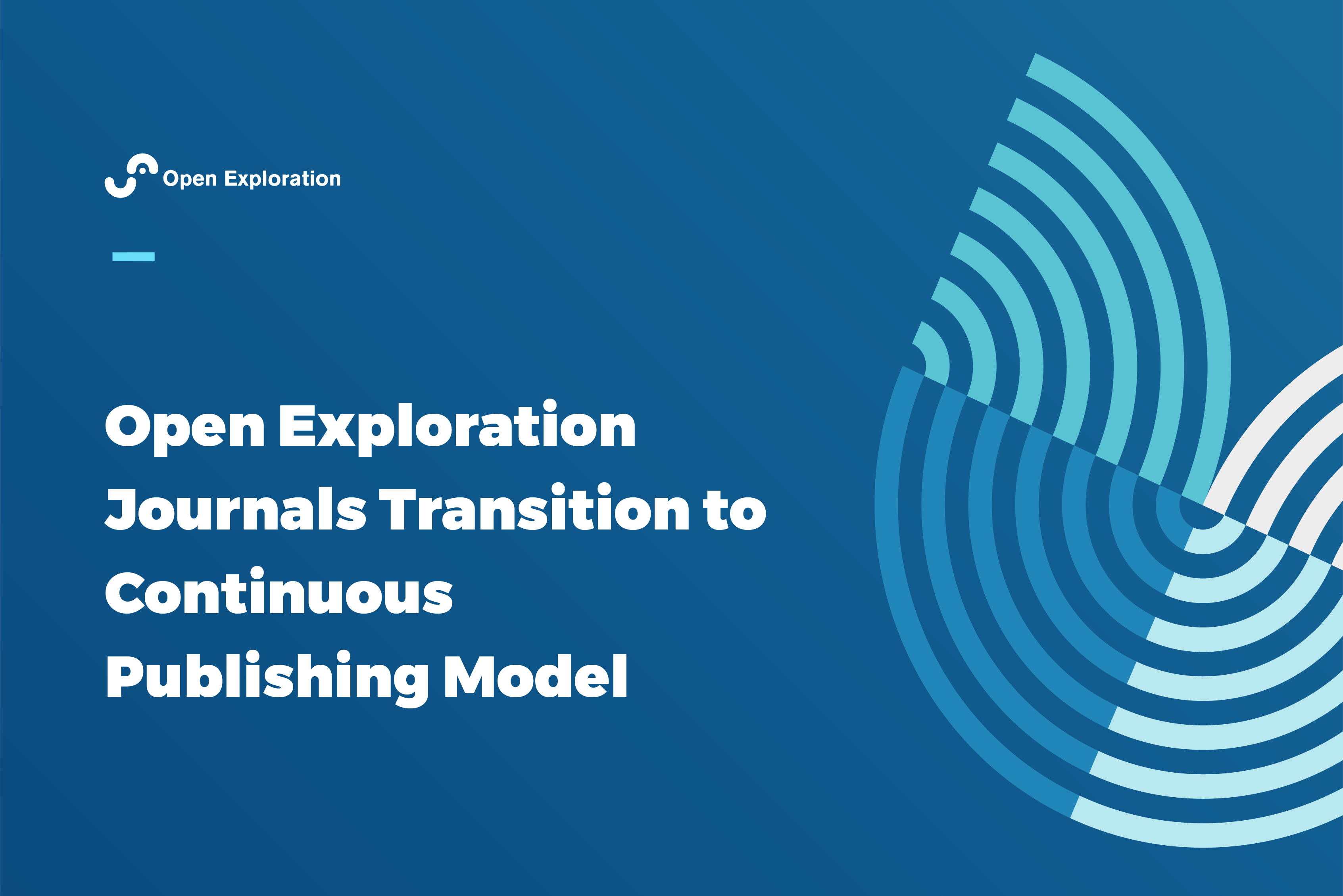
We are very pleased to share some exciting news!
From April 6th 2021, the journal Exploration of Targeted Anti-tumor Therapy (ETAT, https://www.explorationpub.com/Journals/etat) is now officially indexed in the Directory of Open Access Journals (DOAJ).
DOAJ is one of the world's largest open-access databases that indexes and provides access to high quality, open access and peer-reviewed journals, to increase their visibility, accessibility, and impact. All indexed data are free for anyone to access and download and our articles are indexed at: https://doaj.org/toc/2692-3114. Indexing by DOAJ means that the journal’s publishing and open access policies are internationally accepted and is a key advance in increasing the journal’s visibility and influence.
The Editorial Office gratefully acknowledges the Editors-in-Chief, board members, authors, and reviewers for their considerable support to the journal, and the readers for their attention.
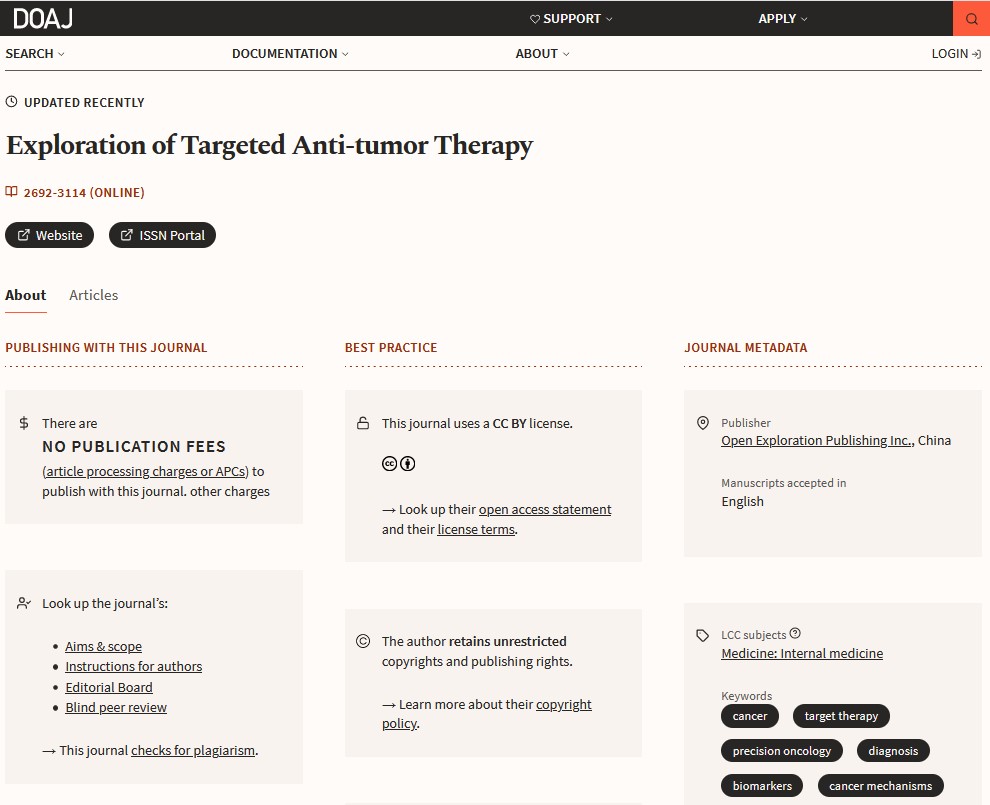
About the journal
ETAT (eISSN 2692-3114, Editors-in-Chief: Prof. Graham Packham, University of Southampton, UK and Dr. Nicola Normanno, Istituto Nazionale Tumori-IRCCS-Fondazione G. Pascale, Italy), is a peer-reviewed, online journal which publishes articles bimonthly on all aspects of cancer research, including clinical diagnosis and analysis, case report, prevention, intervention treatment, pre-clinical and clinical trials of all types of cancers. The journal provides immediate open access to all published content; all content is freely available without charge to users or their Institutes. To attract high quality submissions and relieve the financial burden for researchers, the journal currently provides authors with a free publication service.
The journal has built an international editorial board with 59 excellent scientists from 15 countries and regions around the world, with an average H-index of 39. The male-to-female ratio of our Board members is ~2.5:1.

At the end of March 2021, a total of 37 articles have been published online and these have received extensive attention from readers in this field and good attention based on views/downloads/citations. Some articles are starting to receive citations and several articles with financial support by NIH (https://www.nihms.nih.gov/about/funders/) or Europe PMC funders (https://europepmc.org/Funders/) are available in PMC/Europe PMC.
Article Information | PMID |
Downregulation of 15-hydroxyprostaglandin dehydrogenase during acquired tamoxifen resistance and association with poor prognosis in ERα-positive breast cancer Milene Volpato, Michele Cummings, Abeer M. Shaaban, Balkees Abderrahman, Mark A. Hull, Philipp Y. Maximov, Bradley M. Broom, Reiner Hoppe, Ping Fan, Hiltrud Brauch, V. Craig Jordan, Valerie Speirs* Explor Target Antitumor Ther. 2020;1:355-371 DOI: https://doi.org/10.37349/etat.2020.00021
| |
Targeted inhibition of mRNA translation initiation factors as a novel therapeutic strategy for mature B-cell neoplasms Joe Taylor, Alison M Yeomans, Graham Packham* Explor Target Antitumor Ther. 2020;1:3-25 DOI: https://doi.org/10.37349/etat.2020.00002
| |
Development of PROTACs to address clinical limitations associated with BTK-targeted kinase inhibitors Rachael Arthur, Beatriz Valle-Argos, Andrew J. Steele, Graham Packham* Explor Target Antitumor Ther. 2020;1:131-152 DOI: https://doi.org/10.37349/etat.2020.00009
| |
The impact of tumour pH on cancer progression: strategies for clinical intervention Carol Ward, James Meehan, Mark E Gray, Alan F Murray, David J Argyle, Ian H Kunkler, Simon P Langdon* Explor Target Antitumor Ther. 2020;1:71-100 DOI: https://doi.org/10.37349/etat.2020.00005 | |
Current strategies for the design of PROTAC linkers: a critical review Explor Target Antitumor Ther. 2020;1:273-312 DOI: https://doi.org/10.37349/etat.2020.00018
| |
Integration of PARP-inhibitors in ovarian cancer therapy Explor Target Antitumor Ther. 2020;1:171-182 DOI: https://doi.org/10.37349/etat.2020.00011
|
Since its inception, ETAT has developed 10 special issues covering diverse topics and receiving very strong submissions (https://www.explorationpub.com/Journals/etat/Special_Issues). Among them, the special issues “Liquid Biopsy in Thoracic Cancer”, “Proteolysis Targeting Chimera (PROTAC)”, “Targeting Transcription Factors for Cancer Therapy” and “Immunotherapy in Cancer Patients” have begun to publish articles and their progress is exceeding expectations. Articles in the PROTAC special issue in particular have received widespread attention and the issue of “COVID-19 and Cancer” has received great support for planned submissions.

The remaining special issue articles will be published throughout 2021 and we are now planning additional Special Issues based on other hot topics, such as:
Glioma; Artificial intelligence for precision oncology; Liquid biopsy for early cancer detection; Immunotherapy; EMT/metastasis; Drug targeting/biology of ubiquitin pathway in cancer; Exosomes; MYC function; Cancer metabolism-drug targeted; Drug repurposing for cancer; Microdevices/biosensors; Cancer/microbiome; RNA binding proteins; Organoids; Splicing, drug targeting; Cancer stem cells; Protein-protein interactions as drug targets; Advanced prostate cancer; NRF2 pathway in cancer, etc.
Launched in 2020, this fully Open Access cancer research journal continues to grow in scope and influence. To progress further, we need strong support from you and other out-standing researchers to submit their articles to ETAT. We always welcome:
1. High Quality papers that provide substantial and novel insights into cancer research (APC waived for all authors);
2. Applications from qualified scientists and clinicians to join the Editorial Board;
3. Special Issue Proposals focusing on any interesting topics of cancer research (honorarium offered).
Find out more about the journal: https://www.explorationpub.com/Journals/etat
2024 Annual Progress Report of Open Exploration
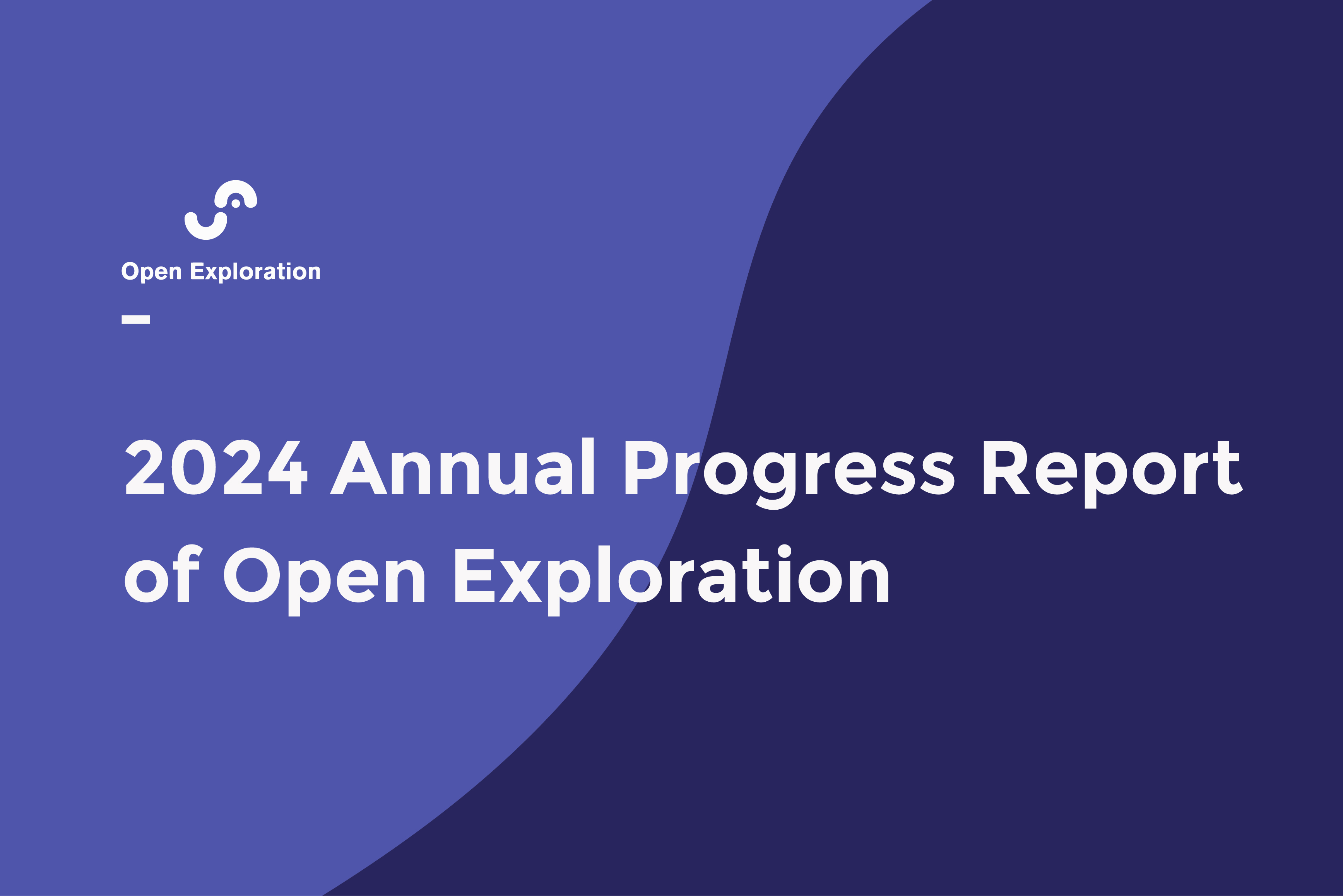
COPE Membership of Exploration of Neuroprotective Therapy Approved

Open Exploration Announces the 2024 Highly Cited Paper Award Winners
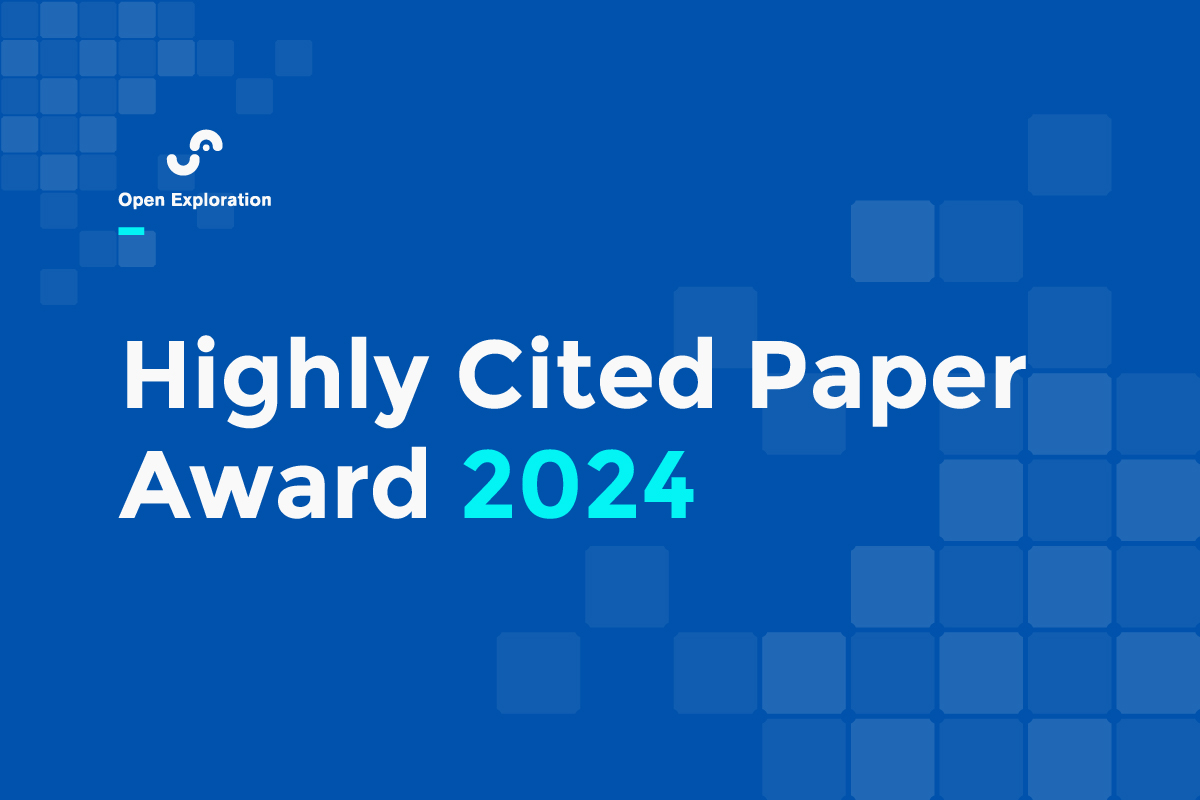
Exploration of Drug Science is Now Indexed in DOAJ!
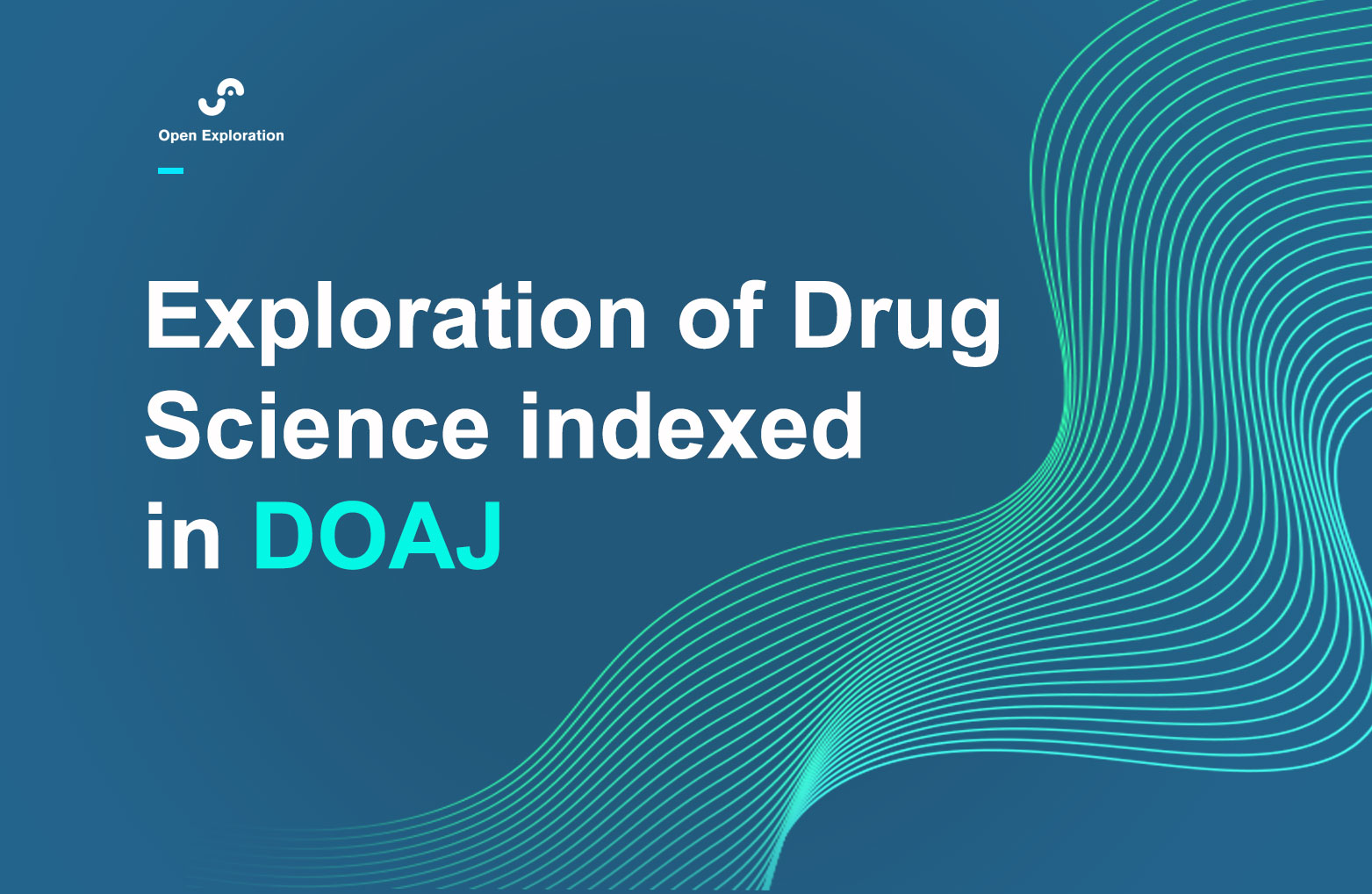
Open Exploration Journals Transition to Continuous Publishing Model
